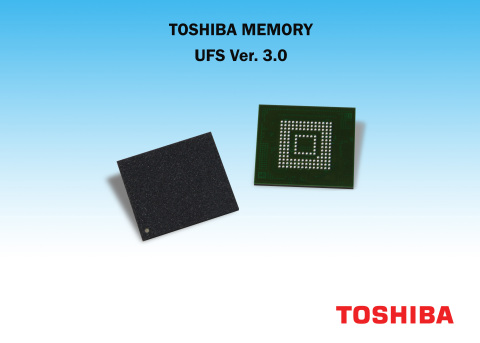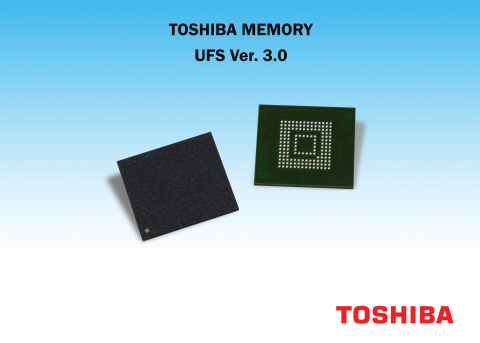SAN JOSE, Calif.--(BUSINESS WIRE)--Toshiba Memory America, Inc. (TMA), the U.S.-based subsidiary of Toshiba Memory Corporation, has started sampling[1] the industry’s first[2] Universal Flash Storage (UFS) Ver. 3.0[3] embedded flash memory devices. The new lineup utilizes the company’s cutting-edge 96-layer BiCS FLASH™ 3D flash memory and is available in three capacities: 128 gigabytes, 256GB and 512GB[4]. With high-speed read/write performance and low power consumption, the new devices are ideal for applications such as mobile devices, smartphones, tablets, and augmented/virtual reality systems.
Consumers continue to demand increasingly higher performance and an improved user experience from their devices, and the UFS standard is constantly being refined in order to support this evolution. With the introduction of UFS 3.0, JEDEC, the global leader in the development of standards for the microelectronics industry, has enhanced previous versions of the UFS standard to help product designers enable significant improvements in mobile devices and related applications.
“As the first company to introduce UFS samples back in early 2013, Toshiba Memory Corporation’s introduction of UFS Ver. 3.0 embedded flash memory devices is further proof that we continue to be at the forefront of storage for next-gen mobile devices,” noted Scott Beekman, director of managed flash memory products for Toshiba Memory America, Inc. “Moving forward, we will continue to drive these advances, maintaining our UFS memory leadership role.”
The new devices integrate 96-layer BiCS FLASH 3D flash memory and a controller in a JEDEC-standard 11.5 x 13mm package. The controller performs error correction, wear leveling, logical-to-physical address translation, and bad-block management for simplified system development.
All three devices are compliant with JEDEC UFS Ver. 3.0, including HS-GEAR4, which has a theoretical interface speed of up to 11.6 Gigabits per second per lane (x2 lanes = 23.2Gbps) while also supporting features that suppress increases in power consumption. Sequential read and write performance of the 512GB device are improved by approximately 70 percent and 80 percent, respectively, over previous generation devices[5].
For more information, please visit business.toshiba-memory.com.
Notes:
[1] Sample shipments of the 128GB device will start today with the rest of the line-up to gradually follow after March. Specification of the samples may differ from that of commercial products.
[2] Source: Toshiba Memory Corporation, as of January 23, 2019.
[3] Universal Flash Storage (UFS) is a product category for a class of embedded memory products built to the JEDEC UFS standard specification. Due to its serial interface, UFS supports full duplexing, which enables both concurrent reading and writing between the host processor and UFS device.
[4] Product density is identified based on the density of memory chip(s) within the Product, not the amount of memory capacity available for data storage by the end user. Consumer-usable capacity will be less due to overhead data areas, formatting, bad blocks, and other constraints, and may also vary based on the host device and application. For details, please refer to applicable product specifications. The definition of 1GB = 230 bytes = 1,073,741,824 bytes.
[5] Toshiba Memory Corporation’s previous generation 256GB device “THGAF8T1T83BAIR”
About Toshiba Memory America, Inc.
Toshiba Memory America, Inc. is the U.S.-based subsidiary of Toshiba Memory Corporation, a leading worldwide supplier of flash memory and solid state drives (SSDs). From the invention of flash memory to today’s breakthrough 96-layer BiCS FLASH™ 3D technology, Toshiba continues to lead innovation and move the industry forward. For more information on Toshiba Memory, please visit business.toshiba-memory.com.
© 2019 Toshiba Memory America, Inc. All rights reserved. Information in this press release, including product pricing and specifications, content of services, and contact information is current and believed to be accurate on the date of the announcement, but is subject to change without prior notice. Technical and application information contained here is subject to the most recent applicable Toshiba product specifications.




